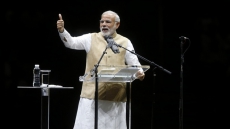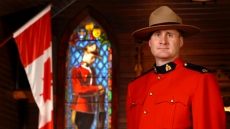OTTAWA — Canada's signature on Monday's sweeping trade deal will open a door for companies to expand deeper into the Asia-Pacific region — but it remains to be seen how many will actually walk through it.
With the world's largest economy right next door, Canada's business community has had good reason to remain focused on the fish-in-a-barrel opportunities offered by the United States market.
So, will Canada's participation in the Trans-Pacific Partnership — a 12-country pact billed as covering 40 per cent of the global economy — encourage Canadian companies to finally step out of their North American comfort zone?
"It's so easy for Canadian firms to just walk across the border," said Ian Lee, an economics professor at Carleton University's Sprott School of Business.
"We can do all these deals, and I totally support these deals, they're absolutely essential. But then the question is: how do you get businesses to seize the opportunities? And that's more difficult."
Lee said up to three quarters of Canada's foreign trade goes to the U.S., which shares similar business laws, language and culture.
He also noted how prime ministers and Bank of Canada governors have long urged business leaders to diversify by looking beyond North America.
Conservative Leader Stephen Harper has repeatedly stressed that overseas trade deals provide key tools that will help create jobs in Canada.
International Trade Minister Ed Fast has acknowledged the Conservative government, which has signed trade deals with more than three dozen countries over the last decade, faces the challenge of persuading overly cautious Canadian businesses to hunt for new markets overseas.
An estimate provided earlier this year by Fast's department said only 40,000 of the country's one million small- and medium-sized businesses were exporters — and only about 10,000 of them exported outside the U.S.

It's not only the allure of the U.S. market that keep Canadian businesses close to home.
Economists blame protectionist measures in Canada for discouraging firms from exploring outside their cosy domestic bubble.
Lee pointed to strict regulations that shield the airline, dairy, poultry, auto and telecom industries, and suggested taking way protectionist measures that discourage companies from looking beyond North American shores.
"But that's a bridge too far, I think, for most politicians, including Harper."
Jack Mintz, an economist from the University of Calgary, said these types of protective measures also limit Canadian productivity, an area where the country has struggled.
Mintz believes Canadian firms are ready to take advantage of deals like the TPP and the country's trade agreement with Europe, which has yet to be fully implemented.
"We are a very open economy and we tend to think of ourselves as traders," Mintz said.
He said that perhaps companies have not been enticed enough by free-trade pacts beyond North America because they involve much smaller economies in places like Jordan, Panama and Honduras.
He did note, however, that Canada's pact with Korea — implemented earlier this year — is a significant agreement.
Canadian firms will also have to brace for stiffer competition as the larger trade agreements with the Asia-Pacific nations and Europe come into force.

Many companies in Canada, however, should be able to make the transition because they're already exposed to global competitors, said trade expert Laura Dawson.
"I don't think that for most of our sectors that Canada is in really any danger of any competitive surprises," said Dawson, director of the Canada Institute at the Woodrow Wilson International Center for Scholars.
However, the TPP will create some winners and losers, she added.
She expects Canadian industries focused on services, higher technology and value-added products will find success in a more-open trading environment, while businesses involved in low-wage assembly and the production of simple products will likely face bigger challenges.
There are other compelling economic reasons why Canadian companies should start looking past the U.S. even if it remains the easiest trading partner, said Wendy Dobson, an economics professor at the University of Toronto's Rotman Institute for International Business.
She pointed to the expansion of the increasingly integrated Asian market and, in relative terms, the declining significance of the U.S. in the world economy.
"We need other markets," Dobson said.
She also warned Canada can't risk failing to innovate nor can it be absent when other countries integrate with each other through trade and investment deals.
If not, Dobson said "there's going to be the piper to pay down the road."

HARPER TOUTS TPP AS OPPONENTS CALL FOR MORE DETAILS ON COMPENSATION
Stephen Harper hit the hustings Tuesday morning touting a landmark trade deal, and new money to pay for any ill effects the agreement will have on the domestic auto sector.
The Conservative leader announced a $1-billion package to help the auto industry cope with the repercussions of the Trans-Pacific Partnership, after unveiling a similar $4.3-billion package for dairy farmers a day earlier.
The Canadian Taxpayers Federation says the money is being used to "buy off favoured sectors" and "simply punish taxpayers" with unneeded spending.
The signing of the 12-country Pacific Rim pact dominated talk on the election trail Tuesday, as Harper's opponents raised questions about the deal, while auto workers protested outside Harper's event in Whitby, Ont.
NDP Leader Tom Mulcair called on Harper to release the full text of the agreement before Canadians go to the polls on Oct. 19 so they can see how many jobs are at risk because of the trade deal.
Liberal Leader Justin Trudeau says he wanted more information on the compensation packages designed to ease the transition for the auto sector to the deal's new tariff structure.




